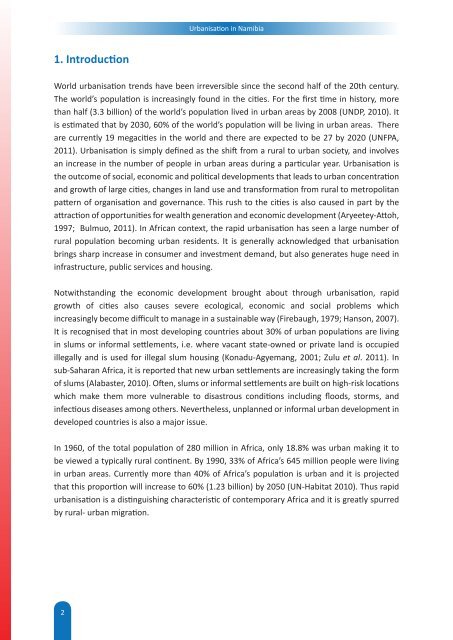Urbanisation-in-Namibia
Urbanisation-in-Namibia
Urbanisation-in-Namibia
You also want an ePaper? Increase the reach of your titles
YUMPU automatically turns print PDFs into web optimized ePapers that Google loves.
<strong>Urbanisation</strong> <strong>in</strong> <strong>Namibia</strong>1. IntroductionWorld urbanisation trends have been irreversible s<strong>in</strong>ce the second half of the 20th century.The world’s population is <strong>in</strong>creas<strong>in</strong>gly found <strong>in</strong> the cities. For the first time <strong>in</strong> history, morethan half (3.3 billion) of the world’s population lived <strong>in</strong> urban areas by 2008 (UNDP, 2010). Itis estimated that by 2030, 60% of the world’s population will be liv<strong>in</strong>g <strong>in</strong> urban areas. Thereare currently 19 megacities <strong>in</strong> the world and there are expected to be 27 by 2020 (UNFPA,2011). <strong>Urbanisation</strong> is simply def<strong>in</strong>ed as the shift from a rural to urban society, and <strong>in</strong>volvesan <strong>in</strong>crease <strong>in</strong> the number of people <strong>in</strong> urban areas dur<strong>in</strong>g a particular year. <strong>Urbanisation</strong> isthe outcome of social, economic and political developments that leads to urban concentrationand growth of large cities, changes <strong>in</strong> land use and transformation from rural to metropolitanpattern of organisation and governance. This rush to the cities is also caused <strong>in</strong> part by theattraction of opportunities for wealth generation and economic development (Aryeetey-Attoh,1997; Bulmuo, 2011). In African context, the rapid urbanisation has seen a large number ofrural population becom<strong>in</strong>g urban residents. It is generally acknowledged that urbanisationbr<strong>in</strong>gs sharp <strong>in</strong>crease <strong>in</strong> consumer and <strong>in</strong>vestment demand, but also generates huge need <strong>in</strong><strong>in</strong>frastructure, public services and hous<strong>in</strong>g.Notwithstand<strong>in</strong>g the economic development brought about through urbanisation, rapidgrowth of cities also causes severe ecological, economic and social problems which<strong>in</strong>creas<strong>in</strong>gly become difficult to manage <strong>in</strong> a susta<strong>in</strong>able way (Firebaugh, 1979; Hanson, 2007).It is recognised that <strong>in</strong> most develop<strong>in</strong>g countries about 30% of urban populations are liv<strong>in</strong>g<strong>in</strong> slums or <strong>in</strong>formal settlements, i.e. where vacant state-owned or private land is occupiedillegally and is used for illegal slum hous<strong>in</strong>g (Konadu-Agyemang, 2001; Zulu et al. 2011). Insub-Saharan Africa, it is reported that new urban settlements are <strong>in</strong>creas<strong>in</strong>gly tak<strong>in</strong>g the formof slums (Alabaster, 2010). Often, slums or <strong>in</strong>formal settlements are built on high-risk locationswhich make them more vulnerable to disastrous conditions <strong>in</strong>clud<strong>in</strong>g floods, storms, and<strong>in</strong>fectious diseases among others. Nevertheless, unplanned or <strong>in</strong>formal urban development <strong>in</strong>developed countries is also a major issue.In 1960, of the total population of 280 million <strong>in</strong> Africa, only 18.8% was urban mak<strong>in</strong>g it tobe viewed a typically rural cont<strong>in</strong>ent. By 1990, 33% of Africa’s 645 million people were liv<strong>in</strong>g<strong>in</strong> urban areas. Currently more than 40% of Africa’s population is urban and it is projectedthat this proportion will <strong>in</strong>crease to 60% (1.23 billion) by 2050 (UN-Habitat 2010). Thus rapidurbanisation is a dist<strong>in</strong>guish<strong>in</strong>g characteristic of contemporary Africa and it is greatly spurredby rural- urban migration.2


